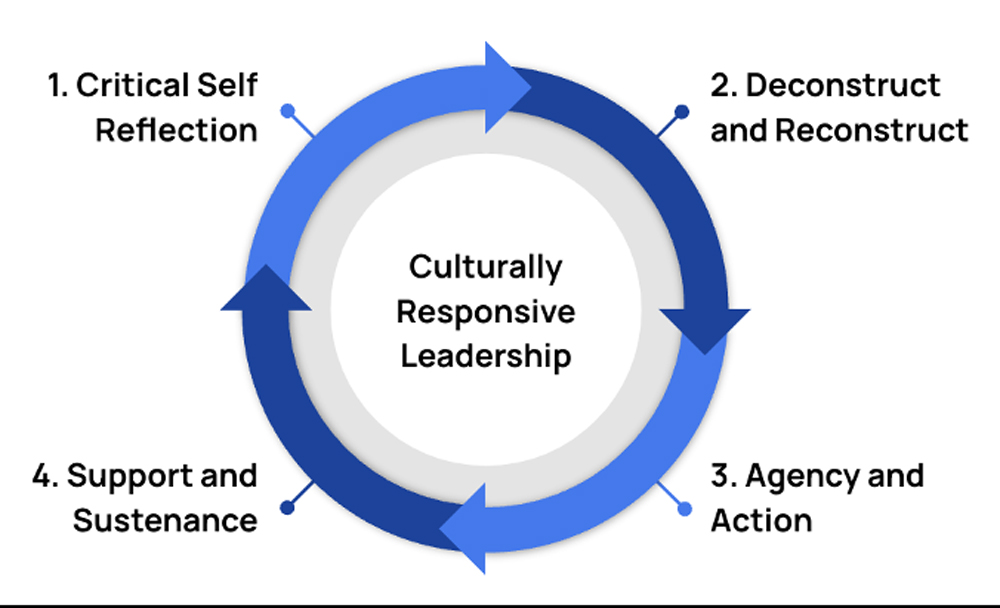
In the fourth article, we examined step three in the Culturally Responsive Leadership (Lopez, 2016) framework; agency and action. In the model seen below, this involves thinking beyond yourself, and looking towards how you can empower both teachers (and other employees) and students to engage in diversity, equity, inclusion, and justice (DEIJ) work. We also examined what action might look like in a variety of contexts.

Support
When thinking about support for your DEIJ work, you want to consider this at a multitude of levels. I want to first speak about the social-emotional support for DEIJ work, and specifically for leaders. We know leaders spend a great amount of time supporting others, but often let self-care fall to the wayside. It is important for leaders to consider two questions: 1. How will I support myself? 2. What does my support network look like? These questions are especially important if you are a leader from a marginalized group.
"Beyond just the time that it takes to work on these projects, and the stress from carrying a workplace’s burden, it’s also onerous to educate others about the pain of systemic racial discrimination" (Nance-Nash, 2020, para. 8).
Although this statement was made in the context of people of color, you can extend this to any marginalized group that is asked to carry the load of DEIJ work. I can’t stress enough that if you are from a marginalized group and doing DEIJ work, build a support network as part of your self-care.
Some of the other key support pieces that you want to consider as a leader are time, funding, and your ability to advocate for the educators. It is one thing to verbally convey your support for DEIJ work, but are you committing time for your staff to collaborate and make progress? If your staff aims to iterate units of study, have you carved out professional learning community (PLC) time, personalized learning day time, or other time slots for them to collaborate with their colleagues to take on such endeavors? You must set the stage for democratic dialogue to take place, for conversations around bias, oppression, marginalization, and egalitarian education (Ross & Berger, 2009). Furthermore, if your staff requires training, how have you ascertained and met their needs? Providing funding for their learning is another way to make a strong statement of support. Lastly, as leaders, we are in a privileged position to advocate. We may have access to boards, executive teams, or owners, and this privilege should not be taken lightly. You can demonstrate your continued support by using your voice.
Sustenance
As leaders, it is our responsibility to help put systems in place which set the foundation for sustainable DEIJ work to carry on for a prolonged period of time, even after you may be gone from your current institution. Only through longitudinal work can systems of oppression in schools be dismantled and rebuilt. As mentioned in article four, Agency and Action, a DEIJ action plan is one way for the work to live on long term.
Another mechanism to sustain the work is through strategic plans. School strategic plans are often longitudinal and provide a roadmap for where the school is heading. Embedding DEIJ work, not just in a DEIJ action plan but in the school wide strategic plan, ensures the work continues for multiple academic years. Embedding DEIJ in a strategic plan sends a strong statement to the internal and external community that your school is committed to change. In some instances, school funding is tied to the strategic plan, so this not only ensures the work will get done, but that it is appropriately funded.
Lastly, working on school policy can also sustain DEIJ work. Lopez states, "School leaders and classroom teachers are on the front lines when it comes to the implementation of educational policies. They play an important role in defining, developing and implementing educational policy" (Lopez, 2016, p. 29). Creating policy not in a vacuum, but as a part of a collaborative process will help to create buy in. Furthermore, it is important for school leaders to understand the policy process so that they can further their DEIJ work, and not perpetuate the injustices and inequities that they are seeking to address (Lopez, 2016).
Taking a multi-pronged approach to supporting and sustaining the DEIJ work in your school will lead to a greater chance of long-term success. Be sure to keep in mind both support and sustanence strategies as you formulate your plan.
References:
Gay, G. (2002). Preparing for culturally responsive teaching. Journal of Teacher Education, 53(2), 106-116.
Howard, A. & Maxwell, C. (2018). From conscientization to imagining redistributive strategies: Social justice collaborations in elite schools. Globalisation. Societies and Education, 16(4), 526–540. https://doi.org/10.1080/14767724.2018.1512048
Lopez, A. E. (2016). Culturally responsive and socially just leadership in diverse contexts: From theory to action. Palgrave Macmillan US. https://doi.org/10.1057/978-1-137-53339-5
Nance-Nash, S. (2020, Sept. 13). How corporate diversity initiatives trap workers of colour. BBC Worklife. https://www.bbc.com/worklife/article/20200826-how-corporate-Diversity-initiatives-trap-workers-of-colour
Ross, J. A., & Berger, M.-J. (2009). Equity and leadership: Research-based strategies for school leaders. School Leadership and Management, 29(5), 463–476. https://doi.org/10.1080/13632430903152310
Shields, C. M. (2019). Becoming a transformative leader: A guide to creating equitable schools (1st ed.). Routledge. https://doi.org/10.4324/9780429261091
--------------------------------------------------------------
Ryan is the Head of School at VERSO International School.
X: @ryanpersaud23
LinkedIn: https://www.linkedin.com/in/ryan-persaud/